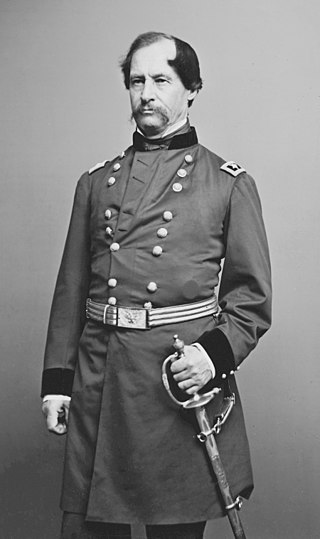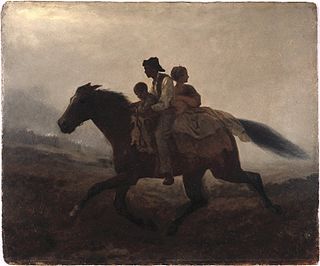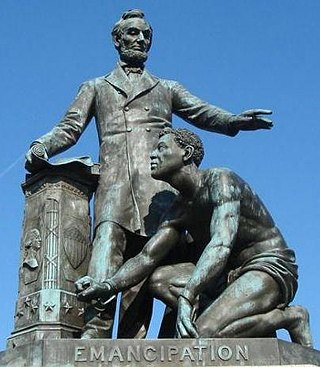
The Emancipation Proclamation, officially Proclamation 95, was a presidential proclamation and executive order issued by United States President Abraham Lincoln on January 1, 1863, during the American Civil War. The Proclamation had the effect of changing the legal status of more than 3.5 million enslaved African Americans in the secessionist Confederate states from enslaved to free. As soon as slaves escaped the control of their enslavers, either by fleeing to Union lines or through the advance of federal troops, they were permanently free. In addition, the Proclamation allowed for former slaves to "be received into the armed service of the United States". The Emancipation Proclamation played a significant part in the end of slavery in the United States.

The Underground Railroad was used by freedom seekers from slavery in the United States and was generally an organized network of secret routes and safe houses. Enslaved Africans and African Americans escaped from slavery as early as the 16th century and many of their escapes were unaided, but the network of safe houses operated by agents generally known as the Underground Railroad began to organize in the 1780s among Abolitionist Societies in the North. It ran north and grew steadily until the Emancipation Proclamation was signed in 1863 by President Abraham Lincoln. The escapees sought primarily to escape into free states, and from there to Canada.

David Hunter was an American military officer. He served as a Union general during the American Civil War. He achieved notability for his unauthorized 1862 order emancipating slaves in three Southern states, for his leadership of United States troops during the Valley Campaigns of 1864, and as the president of the military commission trying the conspirators involved with the assassination of U.S. President Abraham Lincoln.

The Fugitive Slave Act or Fugitive Slave Law was a law passed by the 31st United States Congress on September 18, 1850, as part of the Compromise of 1850 between Southern interests in slavery and Northern Free-Soilers.

In the United States before 1865, a slave state was a state in which slavery and the internal or domestic slave trade were legal, while a free state was one in which they were prohibited. Between 1812 and 1850, it was considered by the slave states to be politically imperative that the number of free states not exceed the number of slave states, so new states were admitted in slave–free pairs. There were, nonetheless, some slaves in most free states up to the 1840 census, and the Fugitive Slave Clause of the U.S. Constitution, as implemented by the Fugitive Slave Act of 1793 and the Fugitive Slave Act of 1850, provided that a slave did not become free by entering a free state and must be returned to their owner. Enforcement of these laws became one of the controversies which arose between slave and free states.

The Fugitive Slave Act of 1793 was an Act of the United States Congress to give effect to the Fugitive Slave Clause of the U.S. Constitution, which was later superseded by the Thirteenth Amendment, and to also give effect to the Extradition Clause. The Constitution's Fugitive Slave Clause guaranteed a right for a slaveholder to recover an escaped slave. The subsequent Act, "An Act respecting fugitives from justice, and persons escaping from the service of their masters", created the legal mechanism by which that could be accomplished.

In the United States, fugitive slaves or runaway slaves were terms used in the 18th and 19th centuries to describe people who fled slavery. The term also refers to the federal Fugitive Slave Acts of 1793 and 1850. Such people are also called freedom seekers to avoid implying that the enslaved person had committed a crime and that the slaveholder was the injured party.
Prigg v. Pennsylvania, 41 U.S. 539 (1842), was a United States Supreme Court case in which the court held that the Fugitive Slave Act of 1793 precluded a Pennsylvania state law that prohibited Blacks from being taken out of the free state of Pennsylvania into slavery. The Court overturned the conviction of slavecatcher Edward Prigg as a result.

Abraham Lincoln's position on slavery in the United States is one of the most discussed aspects of his life. Lincoln frequently expressed his moral opposition to slavery in public and private. "I am naturally anti-slavery. If slavery is not wrong, nothing is wrong," he stated. "I can not remember when I did not so think, and feel." However, the question of what to do about it and how to end it, given that it was so firmly embedded in the nation's constitutional framework and in the economy of much of the country, even though concentrated in only the Southern United States, was complex and politically challenging. In addition, there was the unanswered question, which Lincoln had to deal with, of what would become of the four million slaves if liberated: how they would earn a living in a society that had almost always rejected them or looked down on their very presence.

The fugitive slave laws were laws passed by the United States Congress in 1793 and 1850 to provide for the return of slaves who escaped from one state into another state or territory. The idea of the fugitive slave law was derived from the Fugitive Slave Clause which is in the United States Constitution. It was thought that forcing states to return fugitive slaves to their masters violated states' rights due to state sovereignty and was believed that seizing state property should not be left up to the states. The Fugitive Slave Clause states that fugitive slaves "shall be delivered up on Claim of the Party to whom such Service or Labour may be due", which abridged state rights because apprehending runaway slaves was a form of retrieving private property. The Compromise of 1850 entailed a series of laws that allowed slavery in the new territories and forced officials in free states to give a hearing to slave-owners without a jury.

Contraband was a term commonly used in the US military during the American Civil War to describe a new status for certain people who escaped slavery or those who affiliated with Union forces. In August 1861, the Union Army and the US Congress determined that the US would no longer return people who escaped slavery who went to Union lines, but they would be classified as "contraband of war," or captured enemy property. They used many as laborers to support Union efforts and soon began to pay wages.

The Confiscation Act of 1862, or Second Confiscation Act, was a law passed by the United States Congress during the American Civil War. This statute was followed by the Emancipation Proclamation, which President Abraham Lincoln issued "in his joint capacity as President and Commander-in-Chief".

The Confiscation Act of 1861 was an act of Congress during the early months of the American Civil War permitting military confiscation and subsequent court proceedings for any property being used to support the Confederate independence effort, including slaves.
The Virginia Slave Codes of 1705, were a series of laws enacted by the Colony of Virginia's House of Burgesses in 1705 regulating the interactions between slaves and citizens of the crown colony of Virginia. The enactment of the Slave Codes is considered to be the consolidation of slavery in Virginia, and served as the foundation of Virginia's slave legislation. All servants from non-Christian lands became slaves. There were forty one parts of this code each defining a different part and law surrounding the slavery in Virginia. These codes overruled the other codes in the past and any other subject covered by this act are canceled.
The Confiscation Acts were laws passed by the United States Congress during the Civil War with the intention of freeing the slaves still held by the Confederate forces in the South.
The Grand Contraband Camp was located in Elizabeth City County, Virginia, on the Virginia Peninsula near Fort Monroe, during and immediately after the American Civil War. The area was a refuge for escaped slaves who the Union forces refused to return to their former Confederate masters, by defining them as "contraband of war". The Grand Contraband Camp was the first self-contained black community in the United States and occupied the area of the downtown section of the present-day independent city of Hampton, Virginia.

Slavery played the central role during the American Civil War. The primary catalyst for secession was slavery, especially Southern political leaders' resistance to attempts by Northern antislavery political forces to block the expansion of slavery into the western territories. Slave life went through great changes, as the Southern United States saw Union Armies take control of broad areas of land. During and before the war, enslaved people played an active role in their own emancipation, and thousands of enslaved people escaped from bondage during the war.
The Peonage Abolition Act of 1867 was an Act passed by the U.S. Congress on March 2, 1867, that abolished peonage in the New Mexico Territory and elsewhere in the United States.

From the late 18th to the mid-19th century, various states of the United States allowed the enslavement of human beings, most of whom had been transported from Africa during the Atlantic slave trade or were their descendants. The institution of chattel slavery was established in North America in the 16th century under Spanish colonization, British colonization, French colonization, and Dutch colonization.












